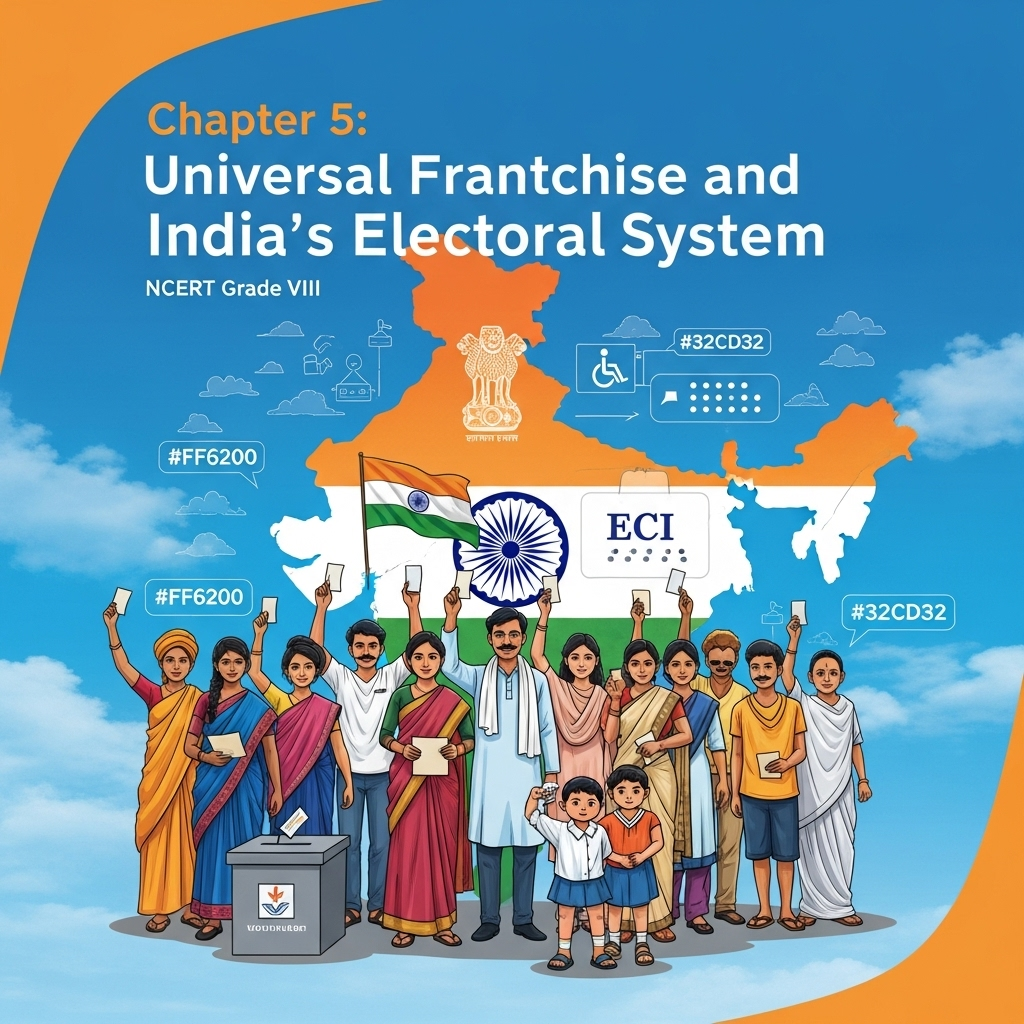Complete Solutions and Summary of Universal Franchise and India’s Electoral System – NCERT Grade 8, Social Science, Chapter 5 – Summary, Questions, Answers, Extra Questions
Detailed summary and explanation of Chapter 5 ‘Universal Franchise and India’s Electoral System’ with all question answers, extra questions, and solutions from NCERT Grade VIII, Social Science (Exploring Society: India and Beyond).
Updated: 4 months ago

Universal Franchise and India’s Electoral System
Chapter 5: Governance and Democracy
Complete Study Guide with Interactive Learning
Chapter Overview
What You'll Learn
Universal Adult Franchise
Understanding the right to vote for all adults and its significance in Indian democracy.
Electoral System
Exploring how elections are organized and conducted across India.
Historical Context
Tracing the evolution of voting rights from pre-independence to modern times.
Accessibility Measures
Learning about innovations to ensure inclusive voting, especially for the elderly and disabled.
Historical Context
This chapter delves into the adoption of universal adult franchise in India post-independence, a groundbreaking decision highlighted by Alladi Krishnaswami Ayyar in 1949. It explores how India, despite a low literacy rate of 14% in 1947, embraced democracy by granting every citizen aged 18 and above the right to vote, a move that set it apart globally, including granting women voting rights ahead of nations like Switzerland. The 2024 Lok Sabha elections, with 980 million voters, underscore the scale and vibrancy of this democratic exercise.
Key Highlights
India’s electoral system manages one of the world’s largest democratic processes, supported by 3.1 million elected representatives across 250,000 local bodies. The Election Commission of India (ECI) ensures fairness through innovative measures like home voting for the elderly and assistive technologies, reflecting a commitment to inclusivity.
Comprehensive Chapter Summary
1. Introduction to Universal Franchise
The chapter opens with Alladi Krishnaswami Ayyar’s 1949 statement from the Constituent Assembly, emphasizing India’s bold adoption of universal adult franchise. This principle ensures every citizen aged 18 and above has one vote with equal value, regardless of caste, creed, race, religion, gender, education, or income, marking a historic democratic experiment.
2. Definition and Importance
Franchise and Suffrage
Franchise, or suffrage, is the constitutional right to vote. Universal adult franchise, a cornerstone of Indian democracy, was established from independence, ensuring equal participation.
Key Benefits
It empowers citizens to determine their future, fosters equality, ensures representation, and promotes civic engagement, as illustrated in the mindmap on page 120.
Historical Shift
Before 1947, only 13% of Indians could vote, but post-independence, universal franchise transformed this, with the voting age reduced from 21 to 18 in 1988.
3. Evolution of Voting Rights
Pre-Independence Era
Prior to 1947, voting was restricted, with only 13% eligible, highlighting the progressive leap to universal franchise at independence.
Women’s Voting Rights
India granted women voting rights from 1947, ahead of many nations like Switzerland (1971), reflecting its progressive democratic vision rooted in ancient traditions.
Age Reduction
The 1988 decision to lower the voting age to 18 expanded youth participation, aligning with democratic inclusivity.
4. India’s Electoral System
Structure and Scale
The Election Commission of India (ECI) manages elections for the Lok Sabha, state assemblies, and local bodies, involving 980 million voters in 2024 across 543 constituencies.
5. Accessibility and Inclusivity
Innovative Measures
In 2024, the ECI introduced home voting for the elderly and disabled, postal voting, and assistive technologies like braille-enabled cards, enhancing participation.
Challenges and Solutions
India’s vast geography and population require officials to reach remote areas, with technology and infrastructure supporting fair elections.
6. Role of the Election Commission
The ECI ensures free and fair elections, addressing barriers through accessibility measures and registering voters, though those guilty of serious crimes are barred.
Key Concepts and Definitions
Universal Adult Franchise
The right of every citizen aged 18 and above to vote, regardless of background.
Franchise
A constitutional right to vote, also known as suffrage.
Constituency
An area whose voters elect a representative to a legislative body.
Electoral System
A system of interconnected elements managing elections for a common democratic purpose.
Election Commission of India (ECI)
The body responsible for organizing and overseeing elections in India.
Accessibility Measures
Innovations like home voting and assistive technologies to include all voters.
Important Facts and Figures
Questions and Answers from Chapter
Short Questions
Q1. What is universal adult franchise?
Q2. What is franchise?
Q3. What is a constituency?
Q4. When was the voting age reduced to 18?
Q5. Who organizes elections in India?
Q6. How many voters were eligible in 2024?
Q7. What is suffrage?
Q8. When did India grant women voting rights?
Q9. What is the minimum voting age in India?
Q10. What is the role of the ECI?
Q11. How many constituencies are there in Lok Sabha?
Q12. When was universal franchise introduced?
Q13. What is an electoral system?
Q14. Who can vote on behalf of others?
Q15. When were postal voting options introduced?
Medium Questions
Q1. Why is universal franchise important in a democracy?
Q2. How did India’s literacy rate affect the decision for universal franchise?
Q3. What changes were made to voting accessibility in 2024?
Q4. Why was the voting age reduced to 18 in 1988?
Q5. How does the ECI ensure fair elections?
Q6. What role do constituencies play in elections?
Q7. Why was universal franchise a bold experiment?
Q8. How did India grant women voting rights early?
Q9. What challenges does India face in conducting elections?
Q10. Why are elected representatives answerable to the electorate?
Q11. How does technology assist in voting?
Q12. What was the pre-independence voting percentage?
Q13. Why can’t one vote on another’s behalf?
Q14. How many elected representatives are there in India?
Q15. What is the purpose of an electoral system?
Long Questions
Q1. Discuss why the Constitution makers decided on universal franchise from the time of Independence.
Q2. Explain the significance of universal franchise in Indian democracy.
Q3. How does the Election Commission of India ensure accessibility in elections?
Q4. Analyze the impact of reducing the voting age to 18 in 1988.
Q5. Discuss the challenges faced by India in conducting elections and how they are addressed.
Q6. Evaluate the role of women’s voting rights in India’s democratic framework.
Q7. How does universal franchise bridge barriers and enable participation?
Q8. What measures has the ECI taken to support people with disabilities?
Q9. Discuss the historical context of voting rights before and after independence.
Q10. How does the electoral system reflect India’s democratic values?
Q11. Explain the process of voter registration in India.
Q12. Why is civic engagement fostered by universal franchise?
Q13. How has technology improved the voting process?
Q14. Discuss the scale of India’s electoral system.
Q15. Evaluate the impact of the 2024 election accessibility measures.
Interactive Knowledge Quiz
Test your understanding of Universal Franchise and India’s Electoral System
Quick Revision Notes
Universal Franchise
- Right to vote at 18
- Equal value of votes
- Introduced in 1947
Electoral System
- ECI management
- 543 constituencies
- 980M voters in 2024
Accessibility
- Home voting
- Assistive technology
- Postal voting
History
- 13% pre-1947
- Women’s rights in 1947
- Age reduced in 1988
Exam Strategy Tips
- Focus on ECI roles
- Understand franchise benefits
- Analyze accessibility measures
- Use timelines
- Study key figures

Group Discussions
No forum posts available.
Easily Share with Your Tribe


